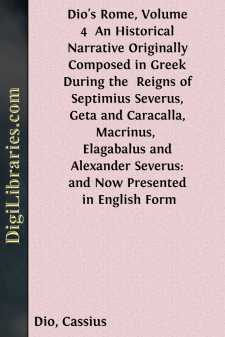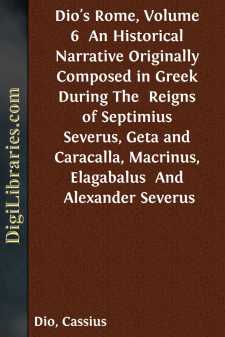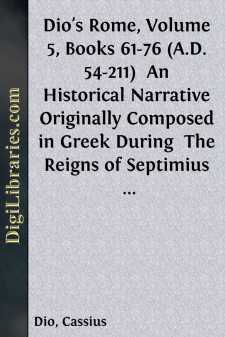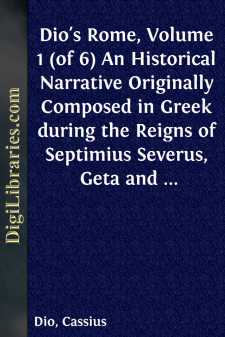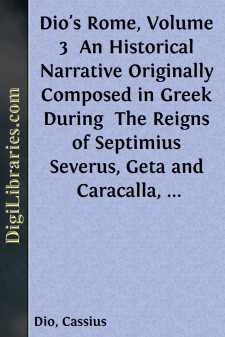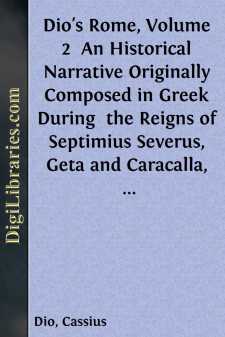Categories
- Antiques & Collectibles 13
- Architecture 36
- Art 48
- Bibles 22
- Biography & Autobiography 813
- Body, Mind & Spirit 142
- Business & Economics 28
- Children's Books 17
- Children's Fiction 14
- Computers 4
- Cooking 94
- Crafts & Hobbies 4
- Drama 346
- Education 46
- Family & Relationships 57
- Fiction 11829
- Games 19
- Gardening 17
- Health & Fitness 34
- History 1377
- House & Home 1
- Humor 147
- Juvenile Fiction 1873
- Juvenile Nonfiction 202
- Language Arts & Disciplines 88
- Law 16
- Literary Collections 686
- Literary Criticism 179
- Mathematics 13
- Medical 41
- Music 40
- Nature 179
- Non-Classifiable 1768
- Performing Arts 7
- Periodicals 1453
- Philosophy 64
- Photography 2
- Poetry 896
- Political Science 203
- Psychology 42
- Reference 154
- Religion 513
- Science 126
- Self-Help 84
- Social Science 81
- Sports & Recreation 34
- Study Aids 3
- Technology & Engineering 59
- Transportation 23
- Travel 463
- True Crime 29
Cassius Dio
Cassius Dio was a Roman statesman and historian of Greek origin, who lived approximately from 155 to 235 AD. He is best known for his monumental work, "Roman History," which spans 80 books covering Roman history from its legendary founding through to AD 229. His accounts, particularly valued for their detailed narrative of the late Republic and early Empire, provide critical insights into Roman political and military affairs.
Author's Books:
Sort by:
by:
Cassius Dio
(BOOK 52, BOISSEVAIN) [-1-] My record has so far stated what the Romans both did and endured for seven hundred and twenty-five years under the monarchy, as a democracy, and beneath the rule of a few. After this they reverted to nothing more nor less than a state of monarchy again, although Cæsar had a plan to lay down his arms and entrust affairs to the senate and the populace. He held a consultation...
more...
by:
Cassius Dio
BOOK 78, BOISSEVAIN.) [Sidenote: A.D. 211 (a.u. 964)] [Sidenote:—1—] After this Antoninus secured the entire power. Nominally he ruled with his brother, but in reality alone and at once. With the enemy he came to terms, withdrew from their country, and abandoned the forts. But his own people he either dismissed (as Papinianus the prefect) or else killed (as Euodus, his nurse, Castor, and his wife...
more...
by:
Cassius Dio
DURATION OF TIME M. Asinius Marcellus, Manius Acilius Aviola. (A.D. 54 = a.u. 807 = First of Nero, from Oct. 13th). Nero Caesar Aug., L. Antistius Vetus. (A.D. 55 = a.u. 808 = Second of Nero). Q. Volusius Saturninus, P. Cornelius Scipio. (A.D. 56 = a.u. 809 = Third of Nero). Nero Caesar Aug. (II), L. Calpurnius Piso. (A.D. 57 = a.u. 810 = Fourth of Nero). Nero Caesar...
more...
by:
Cassius Dio
Four hundred and seven small pages, over and above the Epistle Dedicatory, are contained in Volume One. Really, however, this is not the true Dio at all, but merely his shadow, seized and distorted to satisfy the ideas of his epitomizer, the monk Xiphilinus, who was separated from him by a thousand years in the flesh and another thousand in the spirit. Of the little specimens here and there translated...
more...
by:
Cassius Dio
BOOK 45, BOSSEVAIN.) [B.C. 44 (a. u.710)] [-1-] This was Antony's course of procedure.вÐâGaius Octavius Copia,вÐâthis was the name of the son of Caesar's niece, Attia,вÐâcame from Velitrae in the Volscian country, and having been left without a protector by the death of his father Octavius he was brought up in the house of his mother and her husband, Lucius...
more...
by:
Cassius Dio
BOOK 36, BOISSEVAIN.) The beginning of this book is missing in the MSS. The gist of the lost portion may in all probability be gathered from the following sentences of Xiphilinus (p. 3, R. Steph.): "When the consuls drew lots, Hortensius obtained the war against the Cretans. Because of his fondness, however, for residence in the capital, and because of the courts (in which his influence was only...
more...


